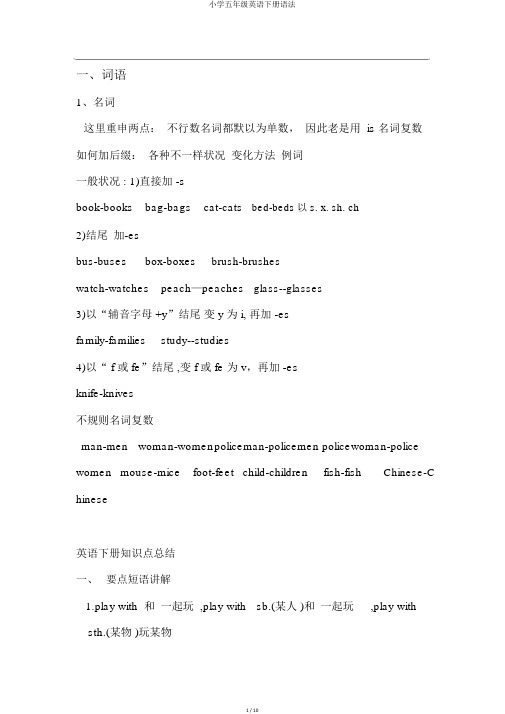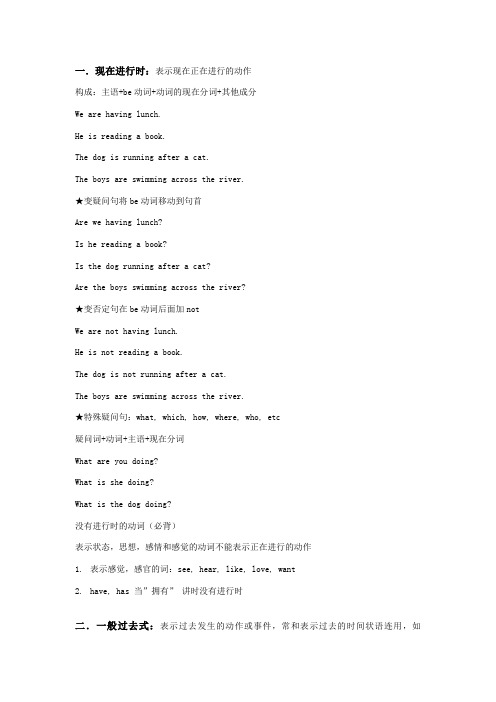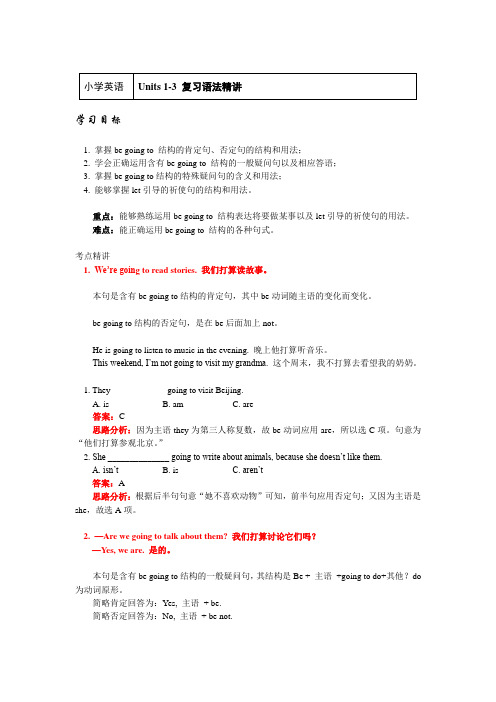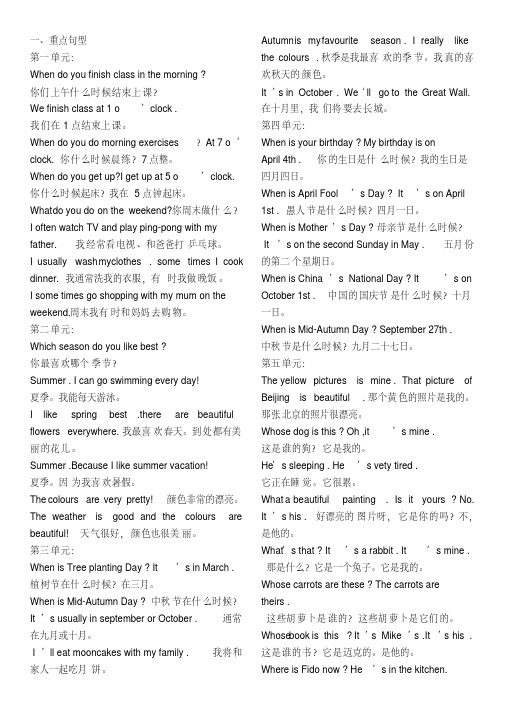小学五年级英语下册语法
2023年苏教版英语五年级下册第七单元语法知识点

五下Unit7 语法知识点
1. 中国老式节日前要加the
the Spring Festival/ the Lantern Festival/ the Double Seventh Festival…
2. 介词on, in, at 旳使用方法
月份前用in in January / in March...
表达一段时间前用in in winter …
详细到某一天用on on the second Sunday of May, on the first of May
on Monday / on Tuesday…
具有Day旳节日前用on on Mother’s Day, on Teachers’ Day…festival 前用at at this festival / at the Dragon Boat Festival ...
3. 日期旳体现措施
the +序数词+of+月份
the thirty-first of October
4. 表达“…旳”
物主代词:my, your, her, his, their, its
名词所有格:Su Hai’s, Mike’s
用of 来表达:the picture of Helen = Helen’s picture
the third months of a year 一年中旳第三个月份
5. 有关天气旳提问
What’s the weather like ? = How is the weather ?
6. 有关when / what day 旳使用方法区别It is Friday . What day is it ?
It is on Friday. When is it ?。
五年级英语下册重点句型

五年级英语下册重点句型基本句型:1. 询问喜欢哪个季节:⑴--- Which season do you like best? 你最喜欢哪个季节?---I like +季节+ best. (例:Ilikespring∕summer∕fall∕winter best)---或:I like summer, because I can swim inthe sea.⑵--- Whatis your favourite season? 你最喜爱的季节是什么?--- Spring∕summer∕fall∕winter is myfavourite season.2. 询问天气:--- What is the weather like in fall inBeijing? 北京秋天的天气是怎么样的?--- It is sunny and cool.3. 询问理由:--- Why do you like winter best? 为什么你最喜欢冬天?--- Because I can play with snow and make asnowman.4. 询问想要做什么--- What would you like to do?--- I’d like to climb∕play sports…… ( I’d = I would )5. 询问具体季节--- What season is it in March in Beijing? 北京的三月份是什么季节?--- It is spring.6. 询问能做什么--- What can I do there? 我在那里能做什么?--- You can go to the Great Wall. 你可以去长城。
7. 询问接下来打算去哪里?( be going to一般将来时)--- Where are you going on vacation? 假期你打算去哪里?--- I am going toCanada. 我将要去加拿大。
人教版五年级英语下册重点句型及语法

人教版五年级英语下册重点句型及语法第一单元1、其他日常活动:eat breakfast 吃早饭 eat lunch吃午饭 eat dinner 吃晚饭get up起床 go to bed 上床睡觉 wash my clothes 洗我的衣服watch TV看电视 go swimming 去游泳 go running去跑步do homework 做作业 do kungfu练武术 play ping-pong打乒乓球play football踢足球 play basketball打篮球 play the pipa弹琵琶play music 演奏音乐 finish class 结束上课 start class 开始上课in the water/sea 在水里/在海里 is good at 擅长 get off 逃脱 lots of 许多2、频度副词。
always总是,一直(100%)usually通常(80%) often 经常(60%)sometimes(30%)有时3、疑问词。
when什么时候 why 为什么 what 什么重点句型。
1、询问别人什么时候做某事的句型及回答。
句型结构:问:When do you+动词短语原形+其他?(你/你们什么时候做某事?)答:I/we(+频度副词)+动词短语原形+at+具体时间(我/我们通常在几点做某事。
)例:问:When do you go to bed?(你什么时候上床睡觉?)答:I go to bed at 9:00p.m (我晚上9点上床睡觉。
)注意:当主语是第三人称单数(he,she,it,单个人名或单数名词)时,助动词do要变成doe s,句型结构是:when does+主语(第三人称单数)+动词短语原形+其他?2、询问别人周末做什么的句型及回答。
句型结构:问:What do you do on the weekend?(你周末做什么?)答:I(+频度副词)+动词(短语)+其他。
小学五年级英语下册语法

一、词语1、名词这里重申两点:不行数名词都默以为单数,因此老是用 is 名词复数如何加后缀:各种不一样状况变化方法例词一般状况 : 1)直接加 -sbook-books bag-bags cat-cats bed-beds以 s. x. sh. ch2)结尾加-esbus-buses box-boxes brush-brusheswatch-watches peach—peaches glass--glasses3)以“辅音字母 +y”结尾变 y 为 i, 再加 -esfamily-families study--studies4)以“ f 或 fe”结尾 ,变 f 或 fe 为 v,再加 -esknife-knives不规则名词复数man-men woman-women p oliceman-policemen policewoman-police women mouse-mice foot-feet child-children fish-fish Chinese-C hinese英语下册知识点总结一、要点短语讲解1.play with 和一起玩 ,play with sb.(某人 )和一起玩,play withsth.(某物 )玩某物eg. Lucy and Lily are playing with their mother.Lucy and Lily are playing with their doll.2.a lot of 好多 a lot of =lots of+可数名词复数或不行数名词eg. 同义句变换=There are There are a lot of apples on the table.apples on the table.3. how often 多久一次,how often 是一个特别疑问词,就频率发问。
英语表示频率的词:一次:once 两次:twice 特别其他次数:基数词 +times 构成比方: 8 次e.g. --How often do you go to the library?eight timesI go to the library once a week.(注:如就划线部分发问,应用特殊疑问词 how often)4.how many 多少 ,how many/much 就数目发问 .how many+可数名词; how much +不行数名词e.g.-- How many boys are there in your class?There are 40 boys in my class.How much water is there in the bottle? There is a little water in the bottle.5.be good at 善于 at 后可加名词或动词。
小学五年级下英语语法总结

一.现在进行时:表示现在正在进行的动作构成:主语+be动词+动词的现在分词+其他成分We are having lunch.He is reading a book.The dog is running after a cat.The boys are swimming across the river.★变疑问句将be动词移动到句首Are we having lunch?Is he reading a book?Is the dog running after a cat?Are the boys swimming across the river?★变否定句在be动词后面加notWe are not having lunch.He is not reading a book.The dog is not running after a cat.The boys are swimming across the river.★特殊疑问句:what, which, how, where, who, etc疑问词+动词+主语+现在分词What are you doing?What is she doing?What is the dog doing?没有进行时的动词(必背)表示状态,思想,感情和感觉的动词不能表示正在进行的动作1.表示感觉,感官的词:see, hear, like, love, want2.have, has 当”拥有”讲时没有进行时二.一般过去式:表示过去发生的动作或事件,常和表示过去的时间状语连用,如yesterday, last night, the day before yesterday, 3 days ago构成:含有be动词的句子,将动词变为过去式,am, is 的过去式为was,are的过去式为wereI was at the butcher’s.You were a student a year ago.The teacher was very beautiful ten years ago.★变疑问句将be动词移动到句首Were you at the butcher’s?Were you a student a year ago?Was the teacher very beautiful ten years ago?★变否定句在be动词后面加notI was not at the butcher’s.You were not a student a year ago.The teacher was not very beautiful ten years ago.★肯定回答/否定回答Yes, I was. / No, I was not.Yes, you were. / No, you were not.Yes, he/she was. / No, he/she was not.★特殊疑问句What did you do?(必背)不含有be动词的句子,将动词变为过去式I finished my homework yesterday.The boy went to a restaurant.The Sawyers lived at King Street a year ago.★变疑问句在句首加did,动词变为原型Did you finish your homework yesterday?Did the boy go to a restaurant?Did the Sawyers live at King Street a year ago?★变否定句在主语和动词之间加did notI did not finish my homework yesterday.The boy did not go to a restaurant.The Sawyers did not live at King Street a year ago.★肯定回答及否定回答Yes, I did. No, I didn’t.Yes, he did. No, he didn’t.Yes, they did. No, they did not.三.过去完成时用法:在过去的时间里,两个动作中,发生在前的那个动作要用过去完成时。
外研社小学英语一起小学5五年级下语法总结及练习题

外研社五年级下语法总结及练习题I. 一般现在时A. 功能:1.表示事物或人物的特征、状态。
如:The sky is blue.天空是蓝色的。
2.表示经常性或习惯性的动作。
如:I get up at six every day.我每天六点起床。
3.表示客观现实。
如:The earth goes around the sun.地球绕着太阳转。
B. 构成:1. be动词:主语+be(am, is, are)+其它。
注意:(我用am,你用are,三单is,复数are。
)肯定句:主语+be+其它. 如:He is a worker. 他是工人。
否定句:主语+ be + not +其它. 如He is not a worker.他不是工人。
一般疑问句:Be +主语+其它? 如:Is he a worker?特殊疑问句:疑问词+一般疑问句? Where is your bike?2.行为动词:主语+行为动词(+其它).如:We study English.我们学习英语。
注意:(当主语为第三人称单数(he, she, it)时,要在动词后加"-s"或"-es"。
如:Mary likes Chinese.玛丽喜欢汉语。
肯定句:主语+动词原形(+其它). 如:I like bread.否定句:主语+ don't( doesn't ) +动词原形(+其它)。
如:I don't like bread.当主语为第三人称单数时,要用doesn't构成否定句。
如:He ofter plays football. He doesn't often play football.一般疑问句:Do( Does ) +主语+动词原形+其它?如:Do you often play football?- Yes, I do. / No, I don't.当主语为第三人称单数时,要用does构成一般疑问句。
五年级英语下册知识讲义-语法精讲(Units 1-3 复习)-湘少版

学习目标1. 掌握be going to 结构的肯定句、否定句的结构和用法;2. 学会正确运用含有be going to 结构的一般疑问句以及相应答语;3. 掌握be going to结构的特殊疑问句的含义和用法;4. 能够掌握let引导的祈使句的结构和用法。
重点:能够熟练运用be going to 结构表达将要做某事以及let引导的祈使句的用法。
难点:能正确运用be going to 结构的各种句式。
考点精讲1.We’re goin g to read stories. 我们打算读故事。
本句是含有be going to结构的肯定句,其中be动词随主语的变化而变化。
be going to结构的否定句,是在be后面加上not。
He is going to listen to music in the evening. 晚上他打算听音乐。
This weekend, I’m not going to visit my grandma. 这个周末,我不打算去看望我的奶奶。
1. They ____________ going to visit Beijing.A. isB. amC. are答案:C思路分析:因为主语they为第三人称复数,故be动词应用are,所以选C项。
句意为“他们打算参观北京。
”2. She ______________ going to write about animals, because she doesn’t like them.A. isn’tB. isC. aren’t答案:A思路分析:根据后半句句意“她不喜欢动物”可知,前半句应用否定句;又因为主语是she,故选A项。
2.—Are we going to talk about them? 我们打算讨论它们吗?—Yes, we are. 是的。
本句是含有be going to结构的一般疑问句,其结构是Be + 主语+going to do+其他?do 为动词原形。
PEP五年级英语下册重点句型

一、重点句型第一单元:When do you finish class in the morning ?你们上午什么时候结束上课?We finish class at 1 o’clock .我们在1点结束上课。
When do you do morning exercises ?At 7 o’clock.你什么时候晨练?7点整。
When do you get up?I get up at 5 o’clock. 你什么时候起床?我在5点钟起床。
What d o you do on the weekend ?你周末做什么?I often watch TV and play ping-pong with my father. 我经常看电视、和爸爸打乒乓球。
I usually wash my c lothes . some times I cook dinner.我通常洗我的衣服,有时我做晚饭。
I some times go shopping with my mum on the weekend.周末我有时和妈妈去购物。
第二单元:Which season do you like best ?你最喜欢哪个季节?Summer . I can go swimming every day!夏季。
我能每天游泳。
I like spring best .there are beautiful flowers everywhere.我最喜欢春天。
到处都有美丽的花儿。
Summer .Because I like summer vacation!夏季。
因为我喜欢暑假。
The colours are very pretty! 颜色非常的漂亮。
The weather is good and the colours are beautiful!天气很好,颜色也很美丽。
第三单元:When is Tree planting Day ? It’s in March . 植树节在什么时候?在三月。
- 1、下载文档前请自行甄别文档内容的完整性,平台不提供额外的编辑、内容补充、找答案等附加服务。
- 2、"仅部分预览"的文档,不可在线预览部分如存在完整性等问题,可反馈申请退款(可完整预览的文档不适用该条件!)。
- 3、如文档侵犯您的权益,请联系客服反馈,我们会尽快为您处理(人工客服工作时间:9:00-18:30)。
一、词语1、名词这里强调两点:不可数名词都默认为单数,所以总是用is 名词复数如何加后缀:各种不同情况变化方法例词一般情况: 1)直接加-sbook-books bag-bags cat-cats bed-beds 以s. x. sh. ch2)结尾加-esbus-buses box-boxes brush-brusheswatch-watches peach—peaches glass--glasses3)以“辅音字母+y”结尾变y为i, 再加-esfamily-families study--studies4)以“f或fe”结尾 ,变f或fe为v,再加-esknife-knives不规则名词复数man-men woman-women policeman-policemen policewoman-police women mouse-mice foot-feet child-children fish-fish Chinese-C hinese英语下册知识点总结一、重点短语讲解1.play with 和…一起玩,play with sb.(某人)和…一起玩,play with sth.(某物)玩某物eg. Lucy and Lily are playing with their mother.Lucy and Lily are playing with their doll.2.a lot of 很多a lot of =lots of+可数名词复数或不可数名词eg. 同义句转换There are a lot of apples on the table.=There are apples on the table.3. how often 多久一次,how often 是一个特殊疑问词,就频率提问。
英语表示频率的词:一次:once 两次:twice 特殊其他次数:基数词+times 构成例如:8次eight timese.g. --How often do you go to the library?I go to the library once a week.(注:如就划线部分提问,应用特殊疑问词how often)4.how many 多少,how many/much 就数量提问.how many+可数名词;how much +不可数名词e.g.-- How many boys are there in your class?There are 40 boys in my class.How much water is there in the bottle? There is a little water in the bottle.5.be good at擅长at后可加名词或动词。
如加动词,应用动名词形式即:v + ing e.g.I am good at English.6.be interested in对….感兴趣in后可加名词或动词。
如加动词,动词应用动名词形式即:v + ing e.g. I am interested in English .7.play the violin拉小提琴,乐器前加定冠词the8.listen to music听音乐, 听…,用listen to1)听音乐前不加定冠词the;2) 听收音机前,要加定冠词the :listen to the radio .e from 来自,come from=be from ,I come from China. =I am from China.易错点:Where are you come from? (错误) Where do you come from? (正确)10. play football 踢足球{球类名词前不加冠词}11.be famous for因…闻名12. have a look at 看一看have a look at =look at13.how much 多少(钱),how much 用来询问价格14.a pair of 一双,一对;a pair of glasses, a pair of trousers15. try on 试穿试穿鞋子try on the shoes=try the shoes on; 试穿它,此处它是代词,只能放在try on之间try it on16.see a doctor看医生常用表示“看”的单词有:watch; see; look; read ;watch:用于看电视,比赛等;watch TV, watch football match see: 看见强调结果,看到什么;看电影、看医生时用see a film; see a doctor17. take good care of好好照顾take (good) care of=look after18. have a fever发烧have +表示症状的单词have a fever; have a toothache; have aheadachehave +病名have measles (麻疹) have mumps (腮腺炎)19. have to不得不Eg: Her mother is ill, she has to look after her mother, so she can’t come to the party.重点:含有have to的句子变否定用don’t doesn’te.g. She has to finish her homework.变否定句为:She doesn’thave to finish her homework. (正确)20. worried about 担心She worried about her exam.21.help with帮助…做某事help with =help sb (to) do sth.Eg: Peter helps her mother with the housework .=Peter helps her mother (to) do the housework.二、重点单词用法1.call v称作What do you call in English?2.Like v 喜欢1)like sth. I like English very much2)like to do sth.I like reading very much, but I don’t like toread now.3)like doing sth. 动词原形3.let’s +动词原形Let’s (=let us) make animals. let sb. do sth. 让某人做某事4.want想,想要1)want sth. I want a piece of paper.2)want to do sth. I want to watch TV.5.情态动词情态动词很简单,没有人称数之变,动词原形后边站。
can 表能力;may许可;should 应该;would 愿;must必须,否定needn’t 换have to不得不表客观三、重点语法A)一般现在时1.概念:一般现在时表示经常性、习惯性的动作或存在的状态。
2.构成:有两种构成形式(1)b e 型句子的谓语动词只有be(am,is,are)a 肯定句中,只出现be :I am a student.我是一名学生。
b.否定句中,要在be 后面加not,如:She isn't teacher.她不是教师。
c.一般疑问句中,要将be 放在句子开头(注意句首字母大写),句尾用问号,答语用Yes,主语+be.或No,主语+be +not如:Are you ready?—你准备好了吗?—Yes,I am.—是的,我准备好了。
No, I’m not. 我没准备好。
)(2)实义动词型:句中的谓语动词为实义动词(也叫行为动词):a.肯定句中,只出现实义动词,如:I get up in the morning.我早晨起床。
b.否定句中,要在实义动词前面加do(does)+not,do(does)作助动词,本身无意义,常与not 缩写成don't (doesn't),如:I don't like vegetables.我不喜欢蔬菜。
c.一般疑问句,要在句子开头加助动词Do(does),句尾用问号,简略答语用Yes,主语+do(does).或No,主语+do(does)+not.如:—Do you like oranges?—你喜欢桔子吗?—Yes,I do.—是的,我喜欢。
3一般现在时的用法1)经常性或习惯性的动作,常与表示频繁度的时间状语连用。
时间状语:every…, sometimes,Eg:I leave home for school at 7 every morning.2)客观真理,客观存在,科学事实。
The earth moves around the sun.Shanghai lies in the east of China.3)表示格言或警句中。
Pride goes before a fall.骄者必败。
注意:此用法如果出现在宾语从句中,即使主句是过去时,从句谓语也要用一般现在时。
例:Columbus proved that the earth is round .3)现在时刻的状态、能力、性格、个性。
I don't want so much.Ann Wang writes good English, but does not speak well.B)一般将来时1.概念:表示将要发生的动作或存在的状态及打算、计划或准备做某事。
句中一般有以下时间状语:tomorrow, next day(week, month, year…),soon, the day after tomorrow(后天)等。
2.基本结构:①be going to+ do.②will+do3.否定句:在be动词后面加not或在will后面加not 成won’t。
例如:I’m going to have a picnic this afternoon.否定句为:I am not going to have a picnic this afternoon.4一般疑问句:be或will 提到句首,some改为any, 改为or,第一二人称互换。
例如:We are going to go on an outgoing this weekend. Are you going to go on an outgoing this weekend?四、对划线部分提问。
